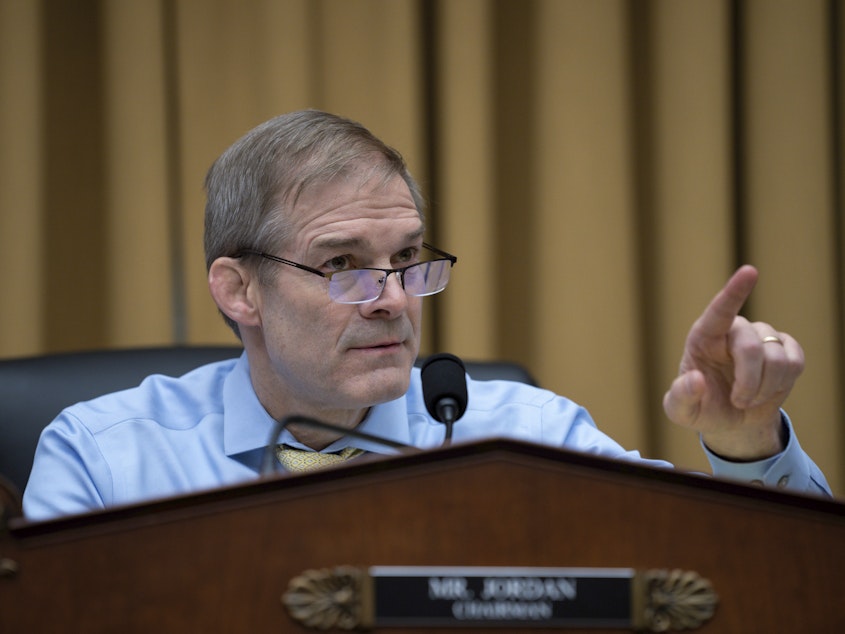In first GOP-led hearing about the border, witnesses paint sharply different pictures

Republicans on the House Judiciary Committee used their first hearing of the new Congress to zero in on what they call a crisis at the southern U.S. border.
The committee's chairman, Rep. Jim Jordan of Ohio, presided over a hearing Wednesday billed as "The Biden Border Crisis — Part I." As the name implies, it's the first of what are likely to be many GOP-led hearings on the situation at the U.S.-Mexico border.
Jordan and other Republicans on the committee blamed the administration's policies for the record number of migrant apprehensions at the border over the past two years — even as President Biden has kept some of President Trump's key border policies in place, including the pandemic restrictions known as Title 42.
Some in the GOP majority also amplified controversial rhetoric about an "invasion" of migrants, and pushed questionable claims about how the synthetic opioid fentanyl is smuggled into the U.S.
Republicans sought to portray the surge in migrants as a threat to communities across the country, while Democrats accused them of fear-mongering and spreading misinformation.
Sponsored
"It is open. The border is dangerous," said Rep. Andy Biggs, a Republican from Arizona. "Drugs pour across, international terrorists, criminal gang members, people from all over the world."
The Biden administration disputes that the border is open, and argues that its recent enforcement measures have led to a drop in the number of illegal border crossings in recent weeks.
But no Biden administration officials were called to testify, leaving Democrats on the committee to defend their record.
"The Biden administration actually expelled over 1.1 million people last year. And recently expanded the use of Title 42, much to the concern of many of us on the committee," said the committee's ranking member, Democratic Rep. Jerrold Nadler of New York, who described the hearing as "political theater."
Dubious assertions about fentanyl smuggling
Sponsored
Republicans on the committee sought to focus attention on the growing number of deaths from fentanyl, which is often smuggled across the southern border from Mexico.
The committee heard testimony from Brandon Dunn, whose 15-year-old son died of fentanyl poisoning last year. Dunn and his wife co-founded a nonprofit group called Forever 15 to spread awareness about fentanyl poisoning.
"Any amount smuggled in a backpack or a fanny pack even in somebody's pocket can be enough to kill thousands of people," Dunn said.
Committee members of both parties offered their condolences to Mr. Dunn — but differed sharply in their interpretations of his testimony.
Democrats pointed out that the vast majority of fentanyl seizures happen at official ports of entry, often in vehicles driven by U.S. citizens. Experts say a relatively small fraction is seized by Border Patrol agents between the ports of entry, while virtually none is seized from migrants who are turning themselves in to seek asylum.
Sponsored
Rep. Mary Gay Scanlon, a Democrat from Pennsylvania, accused Republicans of attempting to "conflate the issues of migrants seeking asylum through our legal processes with the very real scourge of fentanyl trafficking."
But Republicans say there is a connection, because large numbers of migrants crossing the border are distracting Border Patrol agents from doing their jobs.
"The Border Patrol is now distracted processing human beings," said Texas Rep. Chip Roy. "The border patrol can't possibly catch all of the fentanyl at the ports of entry, nor catch all of the fentanyl between the ports of entry."
Witnesses paint sharply different pictures of the border
The committee also heard from a pair of law enforcement officials in border communities, who painted starkly different pictures of the current situation.
Sponsored
The border is "the worst I've seen it," said Sheriff Mark Dannels of Cochise County in southern Arizona. He says his resources are stretched thin trying to help Border Patrol agents catch migrants who try to sneak through the desert.
"The morale of agents is extremely low, and the collective frustration is very high amongst law enforcement at all levels," Dannels said. "This is the largest crime scene in this country."
But the committee also heard from El Paso County Judge Ricardo Samaniego, who described a completely different scenario. "There is no open border in El Paso," Samaniego said, explaining that migrants there routinely turn themselves in to Border Patrol for processing in an orderly fashion.
Samaniego testified that local officials and nonprofit groups have been working closely for years with Border Patrol and other immigration authorities, and have developed a workable strategy for dealing with large numbers of migrants seeking protection in the U.S.
"Humanitarianism and security are not a binary choice. It is the federal government's responsibility to do both," Samaniego said.
Sponsored
Heated rhetoric about 'invasion'
Several times, Republicans on the committee suggested that the Biden administration was deliberately encouraging migrants to cross the border illegally. Rep. Roy of Texas went even further, invoking the word "invasion" to describe the flow of migrants across the border.
Critics have linked that term to the so-called Replacement Theory, the false conspiracy theory that Democrats are deliberately trying to replace white Americans with immigrants of color for political gain.
Judge Samaniego of El Paso rejected that framing.
"There is no invasion of migrants in our community. Nor are there hordes of immigrants committing crimes against citizens or causing havoc in our community," Samaniego said. "Claiming this continues a false racist narrative." [Copyright 2023 NPR]



